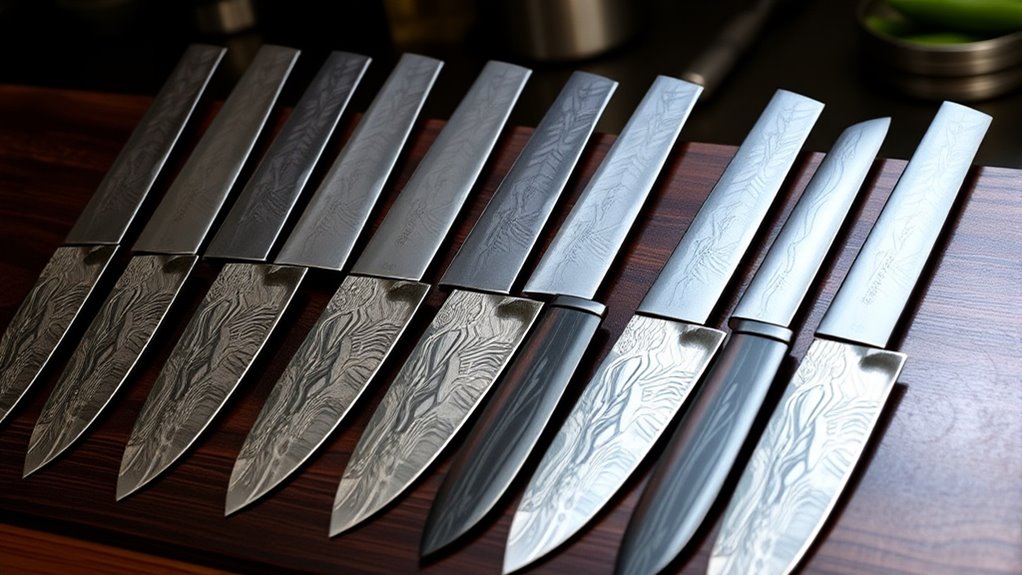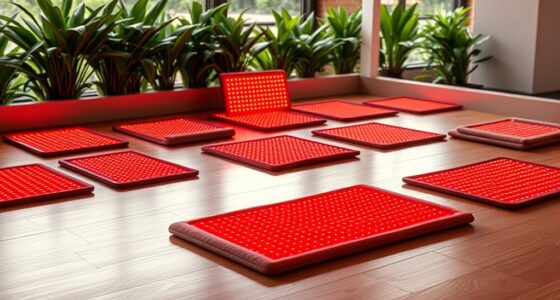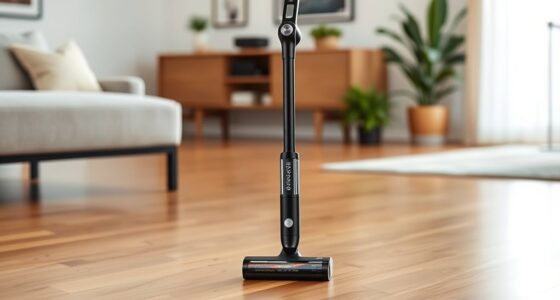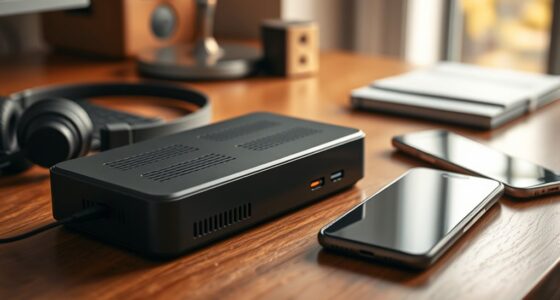I’ve tested and trusted the top Japanese Santoku knives for 2025, and each offers sharp, durable blades with beautiful Damascus or layered steels. They feature comfortable handles made from Pakkawood, G10, or exotic woods, and boast precise craftsmanship, often with scalloped or tsuchime finishes to reduce sticking. Whether you’re a pro or home cook, these knives deliver exceptional performance and longevity. Keep going to discover which models chefs swear by for their kitchen mastery.
Key Takeaways
- Highlights top Japanese santoku knives crafted from premium steels like VG-10, Damascus layered steel, and 440C for superior durability and sharpness.
- Emphasizes ergonomic designs with comfortable handles made from Pakkawood, rosewood, or G10 for enhanced control and reduced fatigue.
- Features ultra-sharp edges sharpened to 12°-15°, with blade styles including scalloped, full tang, and Damascus patterns for aesthetic appeal and performance.
- Includes maintenance tips to preserve blade integrity, highlighting durability, corrosion resistance, and the importance of proper hand washing.
- Showcases knives suitable for both professional chefs and home cooks, with added features like cases, lifetime warranties, and traditional craftsmanship.
imarku 7-Inch Chef Knife with Ultra Sharp Santoku Blade
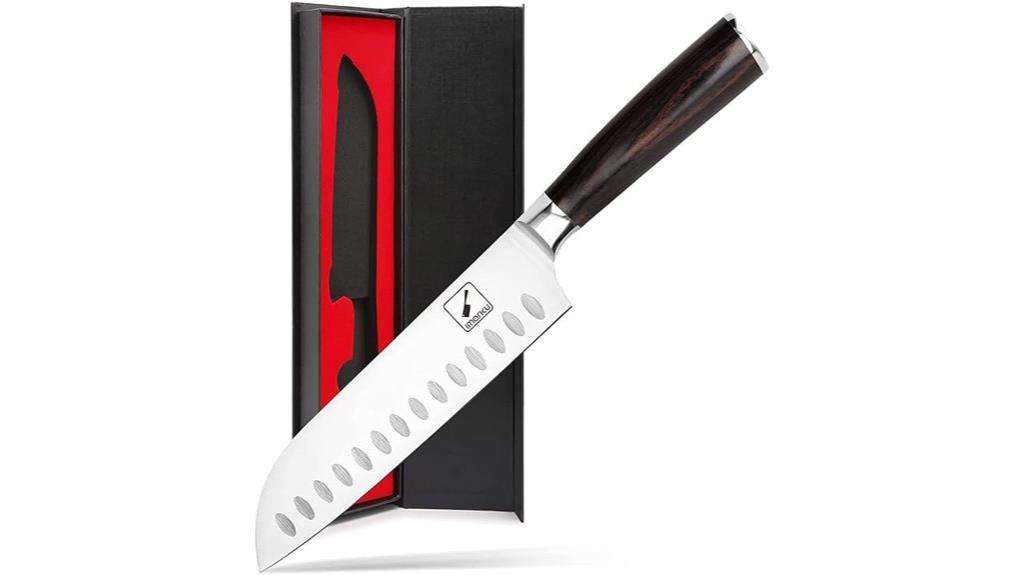
The imarku 7-Inch Chef Knife with Ultra Sharp Santoku Blade is perfect for home cooks and professional chefs who need a reliable, versatile knife. Made from Japanese HC stainless steel, it resists rust, corrosion, and discoloration, ensuring long-lasting performance. The ultra-sharp, polished blade handles chopping, slicing, and dicing with ease, thanks to its scalloped, hollow edge that prevents sticking. The 2.5mm-thick blade is hand-polished to 15-18 degrees per side, offering durability and precision. Its ergonomic Pakkawood handle provides a comfortable, secure grip, making it ideal for everyday culinary tasks in any kitchen.
Best For: home cooks, professional chefs, and culinary enthusiasts seeking a durable, versatile, and sharp kitchen knife for daily meal prep.
Pros:
- Made from high-quality Japanese HC stainless steel resistant to rust and discoloration, ensuring long-lasting performance.
- Ultra-sharp, hand-polished blade with scalloped hollow edge improves slicing, dicing, and mincing efficiency by preventing sticking.
- Ergonomic Pakkawood handle offers a comfortable, secure grip, reducing wrist tension during prolonged use.
Cons:
- The 7-inch size may be less suitable for users preferring larger or smaller knives for specific tasks.
- Hand-polished edge at 15-18 degrees requires careful handling to maintain sharpness.
- The Pakkawood handle, while resistant to cracking, may require occasional maintenance to preserve its appearance.
7 Inch Japanese Chef Knife, Ultra Sharp High Carbon Stainless Steel Kitchen Knife, Professional Santoku Knives with Ergonomic Pakkawood Handle
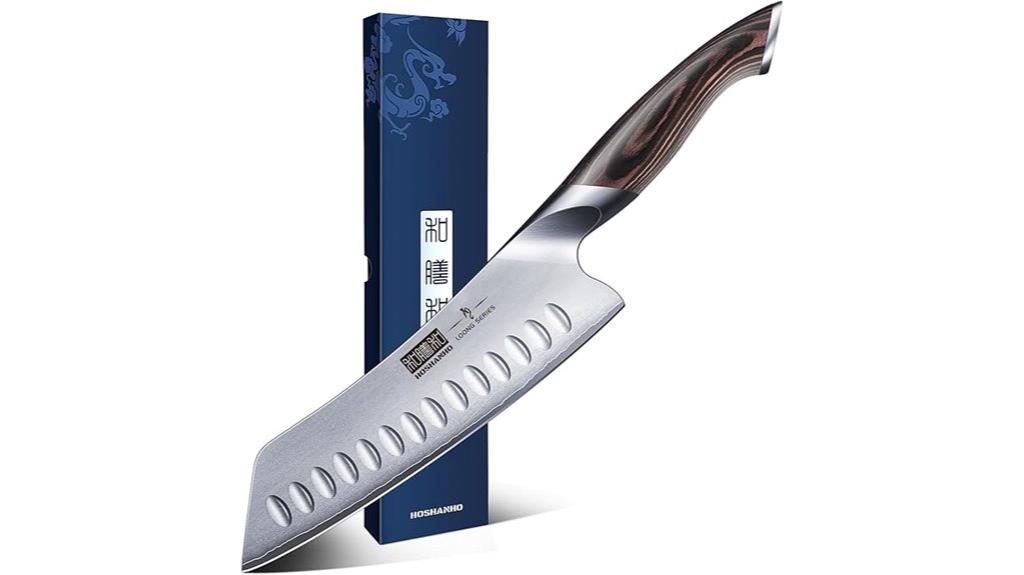
If you’re a home cook or professional chef seeking a versatile, ultra-sharp knife, the 7-inch Japanese chef knife with high carbon stainless steel offers exceptional performance. Crafted from high-end Japanese steel 10Cr15CoMoV and forged with triple-layer laminated steel, it combines durability with a hardness of 62HRC. The plain edge, sharpened to a 15-degree angle, ensures precise cuts with minimal resistance, while the frosted design reduces food sticking. Its ergonomic pakkawood handle provides comfort and control, making it ideal for slicing fruits, vegetables, meats, and bread. Overall, it’s a well-balanced, stylish tool built for both professional kitchens and serious home cooks.
Best For: home cooks and professional chefs seeking a versatile, ultra-sharp Santoku knife for precise slicing and chopping tasks.
Pros:
- Crafted from high-end Japanese steel with exceptional hardness and durability.
- Ultra-sharp 15-degree edge for precise, effortless cuts and minimal food sticking.
- Ergonomic pakkawood handle offers comfort, control, and a stylish appearance.
Cons:
- Heavier and bulkier than lighter knife options, which may cause fatigue during extended use.
- Not dishwasher safe; requires careful hand washing to maintain quality.
- Some users may find the weight less suitable if they prefer lightweight, nimble knives.
KYOKU Santoku Knife, 7-inch Shogun Series with Sheath & Case
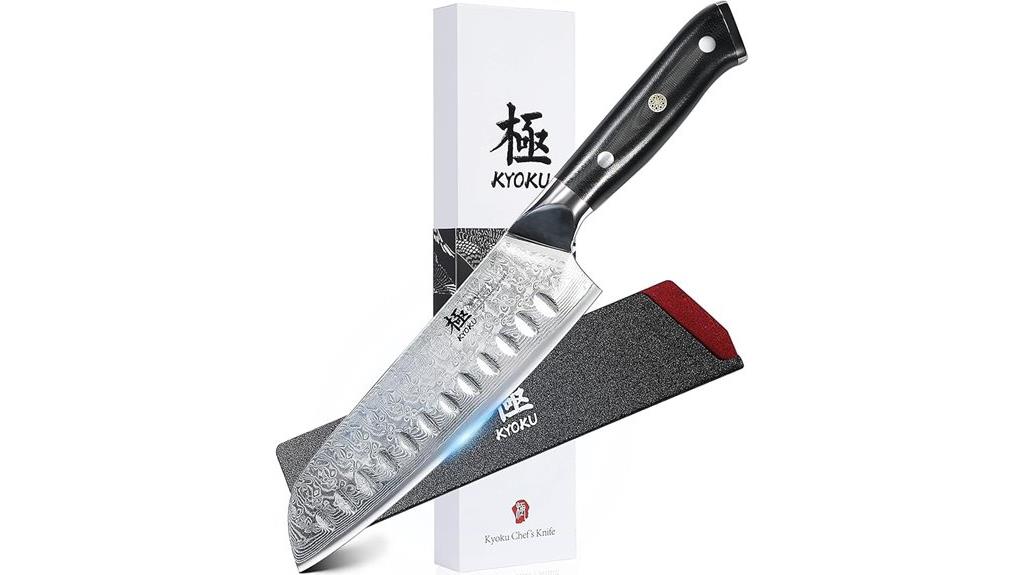
For home chefs and culinary enthusiasts seeking a professional-grade Santoku, the KYOKU 7-inch Shogun Series stands out with its ultra-sharp, handcrafted Damascus blade. Made from Japanese VG-10 super steel with cobalt, it features a 67-layer Damascus pattern, nitrogen-cooled for durability, flexibility, and corrosion resistance. The extra-wide, slightly curved western-style double-bevel edge makes slicing and dicing effortless. Its G10 handle is heat and moisture resistant, providing a secure, comfortable grip. Packaged with a sheath and case for safety and storage, this knife combines traditional craftsmanship with modern performance, earning high praise for sharpness, balance, and aesthetic appeal.
Best For: home chefs, culinary enthusiasts, and professionals seeking a high-performance, durable, and stylish Santoku knife for everyday kitchen tasks.
Pros:
- Razor-sharp, handcrafted Damascus blade with excellent edge retention and easy sharpening
- Well-balanced, comfortable grip with a weighty feel that reduces fatigue during extended use
- Elegant traditional Japanese craftsmanship combined with modern materials and aesthetics
Cons:
- Damascus pattern may fade over time with frequent cleaning and sharpening
- Requires careful handling due to its extreme sharpness to avoid injury
- Limited storage options due to sheath and case, which may need modification for display purposes
MITSUMOTO SAKARI Santoku Chef Knife (7-inch)
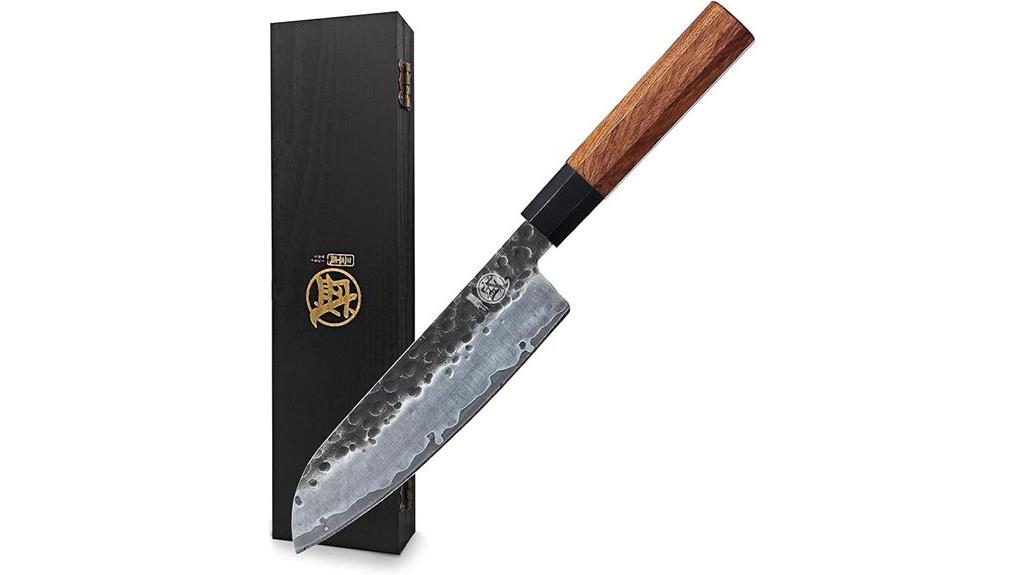
Crafted for both professional chefs and passionate home cooks, the MITSUMOTO SAKARI Santoku Chef Knife (7-inch) stands out with its traditional hand-forged construction and exceptional craftsmanship. Its whipped texture reflects authentic forging art, ensuring durability and aesthetic appeal. Made from three layers of high-carbon 9CR18MOV steel, it’s precision hardened and vacuum cooled with nitrogen, resulting in an ultra-thin, sharp blade that preserves flavors during cutting. The ergonomic octagonal handle, crafted from Southeast Asian sourwood, offers a balanced grip and reduces wrist tension. This knife combines traditional artistry with modern technology, making it a reliable, versatile tool for precise, effortless food preparation.
Best For: professional chefs and passionate home cooks seeking a durable, precisely crafted Santoku knife for versatile kitchen tasks.
Pros:
- Exceptional craftsmanship with traditional hand-forged techniques and authentic whipped texture for durability and aesthetic appeal.
- Made from high-quality, ultra-thin 9CR18MOV high carbon steel that maintains sharpness and flavor during cutting.
- Ergonomic octagonal handle crafted from Southeast Asian sourwood offers balanced grip, comfort, and reduces wrist tension.
Cons:
- The 7-inch size may be less suitable for those preferring larger or smaller knives.
- Hand-forged craftsmanship may require careful maintenance to preserve its finish.
- Premium materials and craftsmanship can make it more expensive compared to mass-produced knives.
Chefs Santoku Knife 7 Inch, High Carbon Steel Kitchen Knife
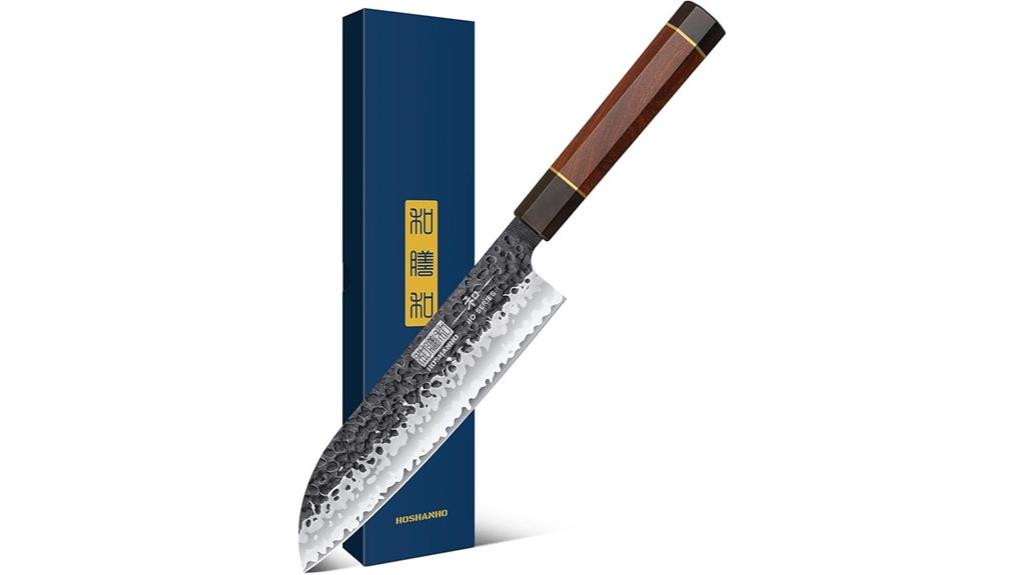
The Chefs Santoku Knife 7 Inch is an excellent choice for professional chefs and serious home cooks who demand precision and durability. Made from high-quality Japanese 10Cr15CoMoV super steel, it offers excellent corrosion and wear resistance. The blade is hand-sharpened and polished at 12-15°, ensuring exceptional sharpness for clean, precise cuts with less effort. Its durable construction resists bending and maintains a long-lasting edge. The octagonal rosewood handle provides a comfortable, balanced grip, reducing fatigue during extended use. With its craftsmanship and aesthetic details, this knife combines traditional Japanese artistry with modern performance, making it a versatile, reliable kitchen tool.
Best For: professional chefs and serious home cooks who require a durable, sharp, and versatile kitchen knife for precise culinary tasks.
Pros:
- Made from high-quality Japanese 10Cr15CoMoV super steel for excellent corrosion and wear resistance
- Hand-sharpened and polished at 12-15° for exceptional sharpness and clean cuts
- Ergonomic octagonal rosewood handle provides comfort, balance, and reduces fatigue during extended use
Cons:
- The high-carbon steel blade may require careful maintenance to prevent rusting
- The octagonal handle, while stylish, might not suit all grip preferences
- Slightly higher price point compared to standard kitchen knives
Shun Premier 7 Santoku Knife

If you’re seeking a versatile kitchen knife that combines elegance with exceptional performance, the Shun Premier 7-inch Santoku Knife is an excellent choice. Designed for slicing vegetables, proteins, and fruits with ease, it offers smooth maneuverability for a variety of tasks. Its hammered tsuchime finish reduces drag and prevents food from sticking, making cuts cleaner and more efficient. Crafted with VG-MAX steel and 68 layers of Damascus cladding, it delivers razor-sharp precision with a 16-degree edge that stays sharp longer. The contoured Pakkawood handle provides a comfortable, secure grip, and the handcrafted Japanese craftsmanship guarantees top-tier quality and durability.
Best For: home cooks and professional chefs seeking a versatile, durable, and elegant Santoku knife for all-purpose slicing tasks.
Pros:
- Razor-sharp edge with long-lasting durability due to VG-MAX steel and Damascus layering.
- Comfortable and secure grip from the contoured Pakkawood handle, suitable for both left and right-handed users.
- Reduced food sticking and cleaner cuts thanks to the hammered tsuchime finish.
Cons:
- Handcrafted Japanese craftsmanship may result in a higher price point.
- Pakkawood handle requires careful maintenance to prevent damage from moisture.
- 7-inch size may not be ideal for those preferring longer or shorter blades for specific tasks.
DDF Kitchen Knife, 7 Inch Santoku Chef’s Knife in Japanese Stainless Steel
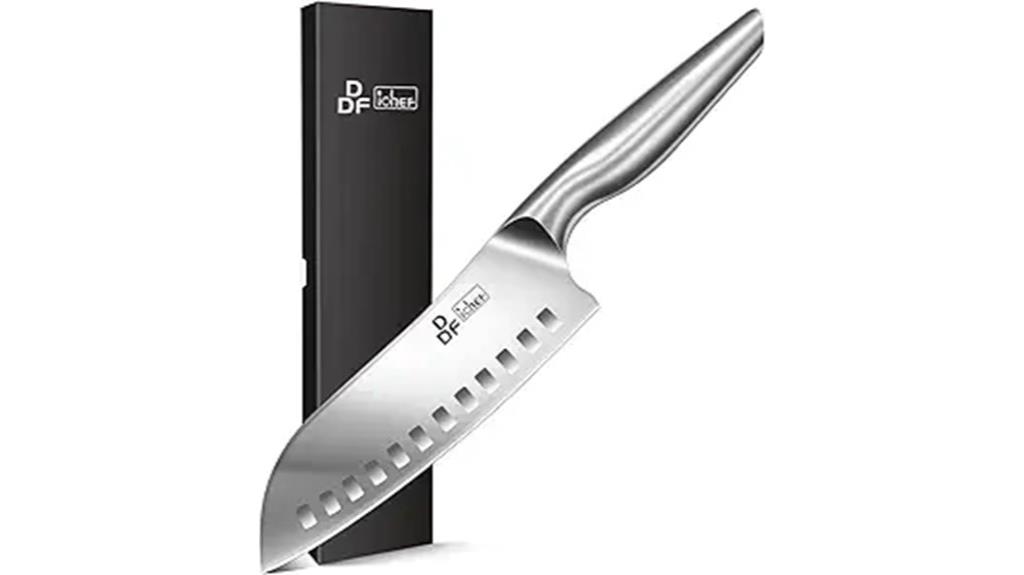
For home cooks and professional chefs alike, the DDF Kitchen Knife’s 7-inch santoku blade offers exceptional precision and control. Made from premium Japanese stainless steel with balanced carbon and chromium content, it’s incredibly durable, corrosion-resistant, and maintains a sharp edge over time. Forged for strength, its well-balanced design reduces fatigue, while the ergonomic stainless steel handle provides a secure grip. The thin, double-edged blade easily slices through vegetables, meat, and cheese, making everyday prep effortless. Highly rated and affordable, this knife combines performance with durability, making it a reliable choice for anyone seeking a versatile, long-lasting kitchen tool.
Best For: home cooks and professional chefs seeking a versatile, durable, and easy-to-handle santoku knife for daily kitchen tasks.
Pros:
- Extremely sharp with excellent edge retention, making slicing effortless
- Well-balanced design and ergonomic handle reduce fatigue during extended use
- Made of high-quality Japanese stainless steel, offering durability and corrosion resistance
Cons:
- Comes without a protective sheath, requiring separate storage solutions for safety
- The knife’s sharpness may lead to accidental cuts if not handled carefully
- Slightly heavier than some other knives, which might be less comfortable for users preferring lighter tools
Damascus Santoku Knife 7 Inch, Japanese Damascus Steel Kitchen Knife
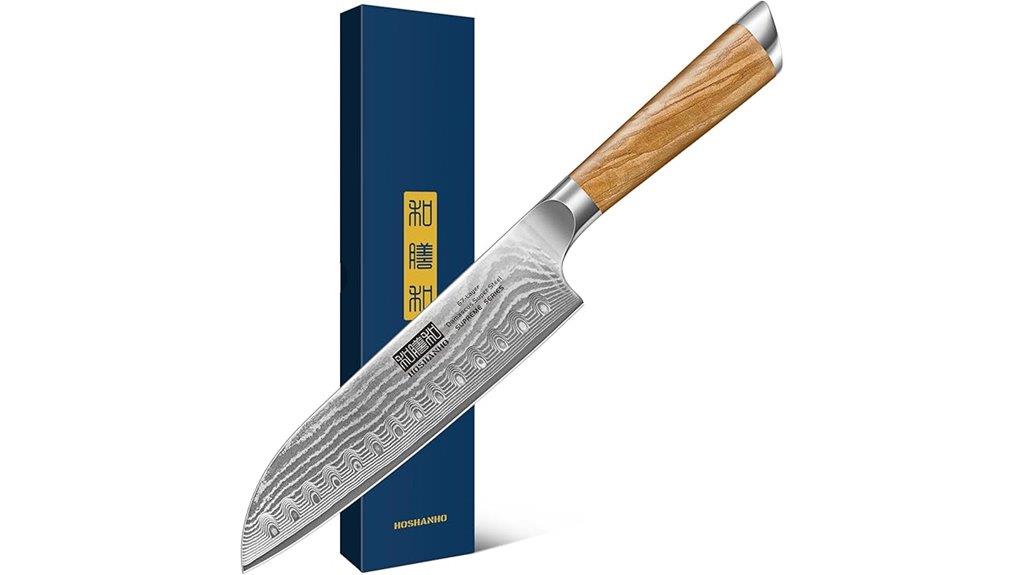
Crafted for serious home cooks and professional chefs alike, the Damascus Santoku Knife 7 Inch stands out with its exceptional craftsmanship and performance. Its VG-10 steel core, hardened to 62HRC, ensures outstanding toughness and wear resistance, enhanced by vacuum heat treatment and nitrogen cryogenic tempering. Hand-forged using traditional techniques, the blade features a beautiful natural casting texture and sharpens to 15 degrees per side with the Honbazuke method. The 7-inch blade, equipped with grooves to reduce sticking, offers effortless slicing across various ingredients. The ergonomic olive wood handle provides comfort and balance, making this versatile knife a top choice for daily culinary tasks.
Best For: home cooks and professional chefs seeking a high-quality, versatile, and durable Santoku knife for everyday culinary tasks.
Pros:
- Crafted with VG-10 steel core for exceptional toughness and wear resistance
- Hand-forged with traditional techniques and sharpened to a precise 15-degree edge for razor-sharpness
- Ergonomic olive wood handle offers comfort, balance, and reduces fatigue during extended use
Cons:
- The 7-inch size may be too large for some users with smaller hands or limited storage space
- Hand-forged craftsmanship and high-quality materials may result in a higher price point
- The natural wood handle, while durable, requires proper maintenance to prevent drying or cracking
KAWAHIRO 7-Inch Japanese Santoku Chef Knife
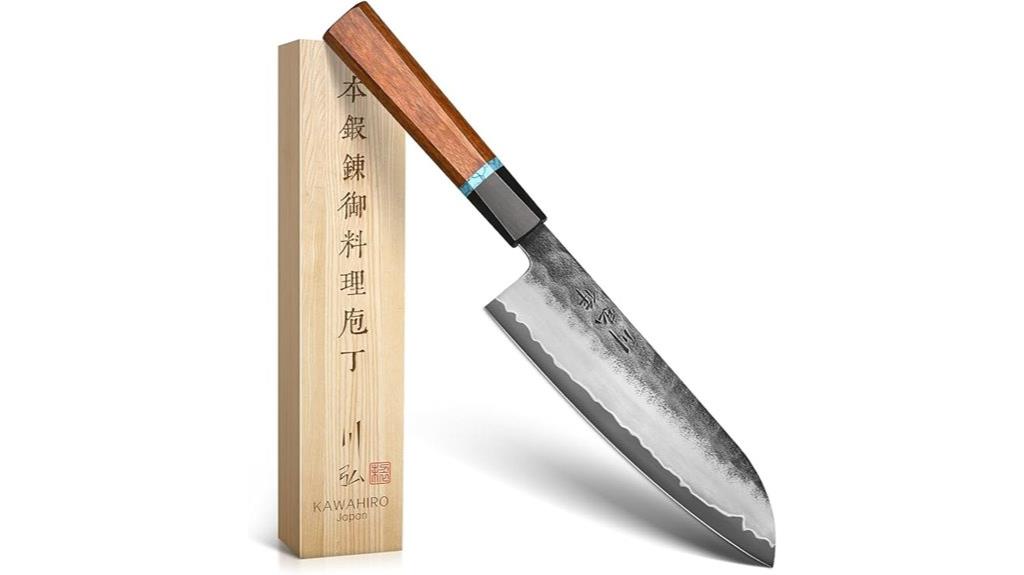
The KAWAHIRO 7-Inch Japanese Santoku Chef Knife stands out as an ideal choice for serious home cooks and professional chefs who demand exceptional precision and craftsmanship. Hand-forged with traditional techniques, it features a VG10 steel blade with a three-layer composite structure for durability and sharpness. The 0-degree hand-ground edge delivers ultra-thin slices and clean cuts, while the balanced design reduces fatigue. Its ergonomic handle, crafted from ebony, turquoise, and padauk woods, offers comfort during extended use. Packaged in an elegant wooden box, this knife isn’t just a tool—it’s a work of art, perfect for elevating any kitchen.
Best For: Serious home cooks and professional chefs seeking exceptional precision, durability, and craftsmanship in their kitchen tools.
Pros:
- Hand-forged VG10 steel blade with a durable three-layer composite structure for long-lasting sharpness
- Ultra-thin, 0-degree hand-ground edge for precise, clean cuts through vegetables and proteins
- Ergonomic handle combining ebony, turquoise, and padauk woods for comfortable, balanced use during extended prep
Cons:
- Premium craftsmanship and materials may come with a higher price point
- Hand-forged knives require careful handling and maintenance to preserve their edge
- The handcrafted wooden box, while elegant, may require special care to maintain its appearance
HexClad 7-Inch Japanese Damascus Stainless Steel Santoku Knife
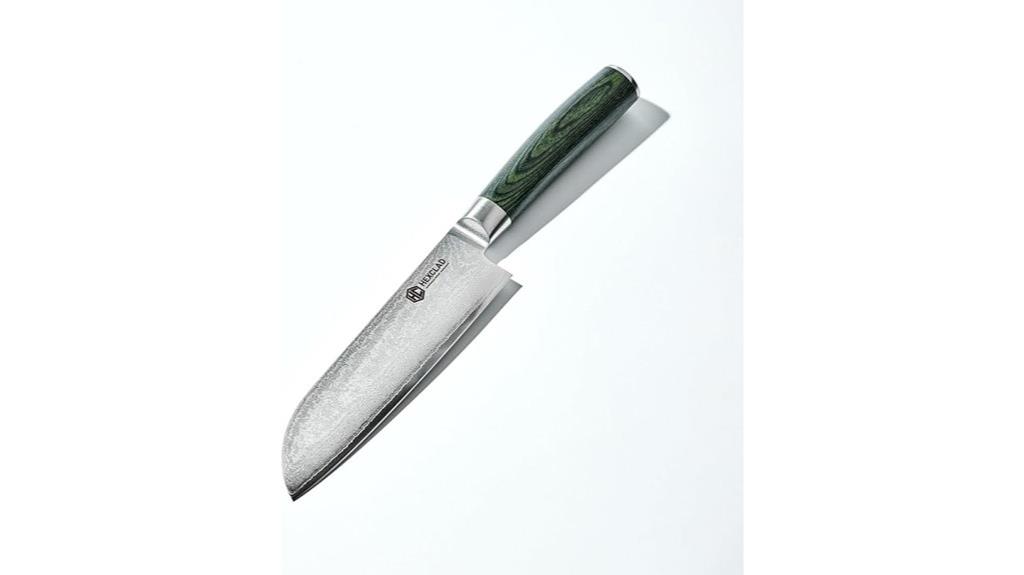
If you’re seeking a versatile and durable Santoku knife that delivers precision in every cut, the HexClad 7-Inch Japanese Damascus Stainless Steel model is an excellent choice. Its 67-layer Damascus steel blade offers exceptional hardness and longevity, thanks to advanced 3-step Honbazuke heat treatment that creates a razor-sharp 12-degree edge. The ergonomic 4.5-inch Pakkawood handle provides comfort and control, making chopping, dicing, and mincing effortless. Perfect for meat, fish, or vegetables, this knife maintains sharpness over time with proper care. Plus, HexClad’s lifetime warranty assures quality, making it a reliable, high-performance tool for both home cooks and professionals.
Best For: home cooks and professional chefs seeking a versatile, durable, and precisely sharp Santoku knife for various culinary tasks.
Pros:
- Features a 67-layer Damascus stainless steel blade for enhanced hardness and longevity
- Equipped with an ergonomic Pakkawood handle for comfort and control during extended use
- Maintains sharpness over time with proper care and advanced heat treatment technology
Cons:
- Hand washing is required; dishwasher use can damage the blade and void the warranty
- Cutting on hard surfaces may dull or damage the blade, affecting performance and warranty coverage
- Proper maintenance is necessary to prevent rust, discoloration, and bending or breaking of the blade
Shun Classic 7 inch Santoku Knife, Handcrafted in Japan, DM0702

For home cooks and professional chefs who value precision and versatility, the Shun Classic 7-inch Santoku Knife stands out as an excellent choice. Handcrafted in Japan, it features a high-carbon VG-10 steel core layered with 16 stainless steel layers, creating a beautiful Damascus pattern that prevents sticking. Its 25+ degree edge can be sharpened to 18 degrees for longer-lasting sharpness. The ergonomic ebony Pakkawood handle offers comfort and control, while the balanced weight makes chopping, mincing, and slicing effortless. With a reputation for sharpness and durability, this knife transforms everyday prep into a precise, enjoyable experience.
Best For: home cooks and professional chefs seeking a versatile, high-precision knife with elegant craftsmanship and long-lasting sharpness.
Pros:
- Handcrafted in Japan with a beautiful Damascus pattern and superior craftsmanship.
- Razor-sharp VG-10 steel core with a 25+ degree edge, sharpenable to 18 degrees for enhanced durability.
- Ergonomic ebony Pakkawood handle provides comfort, control, and a secure grip.
Cons:
- Higher price point compared to standard kitchen knives, reflecting premium materials and craftsmanship.
- Hand wash recommended to maintain blade integrity, which may be less convenient than dishwasher-safe alternatives.
- Slightly shorter than a traditional chef’s knife, which may require adjustment for some users used to larger blades.
KYOKU 7 Inch Santoku Knife – Daimyo Series with Rosewood Handle
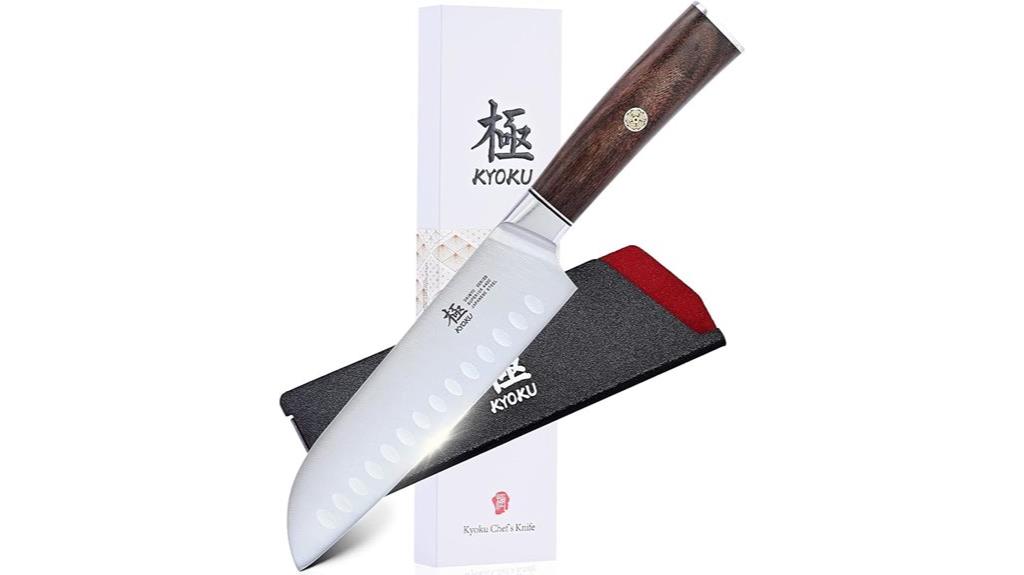
When searching for a versatile and precisely crafted santoku knife, the KYOKU 7 Inch Santoku Knife from the Daimyo Series stands out as an excellent choice for both professional chefs and serious home cooks. Its Japanese 440C stainless steel blade, vacuum heat-treated, offers exceptional durability, corrosion resistance, and edge retention. The well-balanced, forged construction features an ergonomic rosewood handle with a mosaic pin, ensuring comfort during extended use. The hollow edge allows for clean, precise cuts through meat, fish, vegetables, and fruits. Praised for its sharpness, balance, and craftsmanship, this knife is perfect for those who value performance and elegance in their kitchen.
Best For: both professional chefs and serious home cooks seeking a versatile, durable, and precisely crafted santoku knife for daily kitchen tasks.
Pros:
- Ultra-sharp blade with excellent edge retention for clean, precise cuts
- Well-balanced, ergonomic design reduces fatigue during extended use
- Made of high-quality Japanese 440C stainless steel with corrosion resistance
Cons:
- Not dishwasher safe; requires hand washing to maintain quality
- Slightly higher price point compared to basic knives, but justified by craftsmanship
- Handle size and shape may be less suitable for very small or very large hands
Home Hero Japanese Santoku Knife Collection
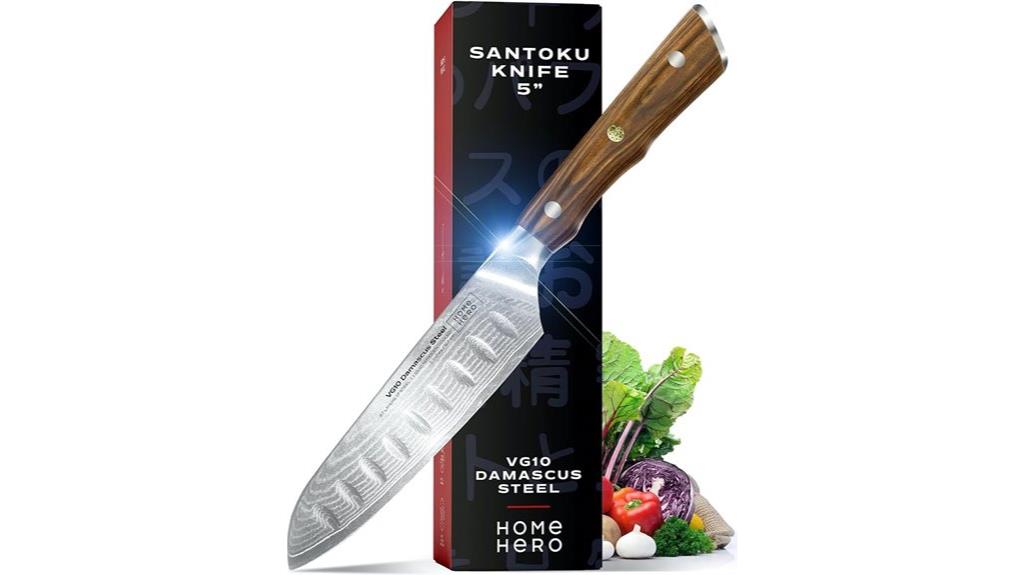
The Home Hero Japanese Santoku Knife Collection stands out as an excellent choice for both home cooks and professional chefs seeking a versatile, high-quality kitchen tool. Crafted from VG10 Damascus steel with 67 layers, it offers remarkable durability and a razor-sharp edge. The 5-inch blade excels at slicing, mincing, and dicing a variety of ingredients, from meat to vegetables. Its full tang and ergonomic rosewood handle provide stability, comfort, and precise control, even during extended use. Packaged in an elegant black box with a protective sheath, it’s not only functional but also makes a stylish gift. This collection truly elevates culinary performance.
Best For: home cooks and professional chefs seeking a versatile, high-quality Santoku knife for precise slicing and dicing.
Pros:
- Crafted from durable VG10 Damascus steel with 67 layers for exceptional sharpness and longevity
- Full tang construction with ergonomic rosewood handle for stability and comfortable grip
- Elegant packaging makes it an ideal gift for culinary enthusiasts and professionals
Cons:
- Slightly higher price point due to high-quality materials and craftsmanship
- Requires proper care to maintain the Damascus steel’s sharpness and appearance
- 5-inch blade may be less suitable for users preferring larger or smaller knives
Yoshihiro VG10 46 Layers Damascus Santoku Japanese Chef Knife

If you’re looking for a versatile, high-performance santoku knife that combines traditional craftsmanship with modern durability, the Yoshihiro VG10 46 Layers Damascus Santoku is an excellent choice. Its VG10 stainless steel core, layered with 46 Damascus sheets, creates a stunning hammered finish that reduces food sticking and adds elegance. With a hardness of HRC 60, it stays sharp longer and handles a variety of tasks with ease. The octagonal rosewood handle offers a comfortable, ergonomic grip, while the included Magnolia wood saya provides protection and aesthetic appeal. This knife balances beauty, function, and craftsmanship, making it a top pick for both professional chefs and home cooks.
Best For: professional chefs and home cooks seeking a versatile, durable, and aesthetically pleasing santoku knife for a wide range of kitchen tasks.
Pros:
- High-quality VG10 stainless steel core with 46-layer Damascus layers offers excellent sharpness and durability.
- Hammered textured finish reduces food sticking and adds visual elegance.
- Ergonomic octagonal rosewood handle provides a comfortable and secure grip for extended use.
Cons:
- Hand wash recommended; not dishwasher safe, requiring careful maintenance.
- Slightly higher price point may be a barrier for casual or beginner cooks.
- Blade length and weight might require some adjustment for users accustomed to different knife styles.
Traditional Japanese Professional Kitchen Knife Set
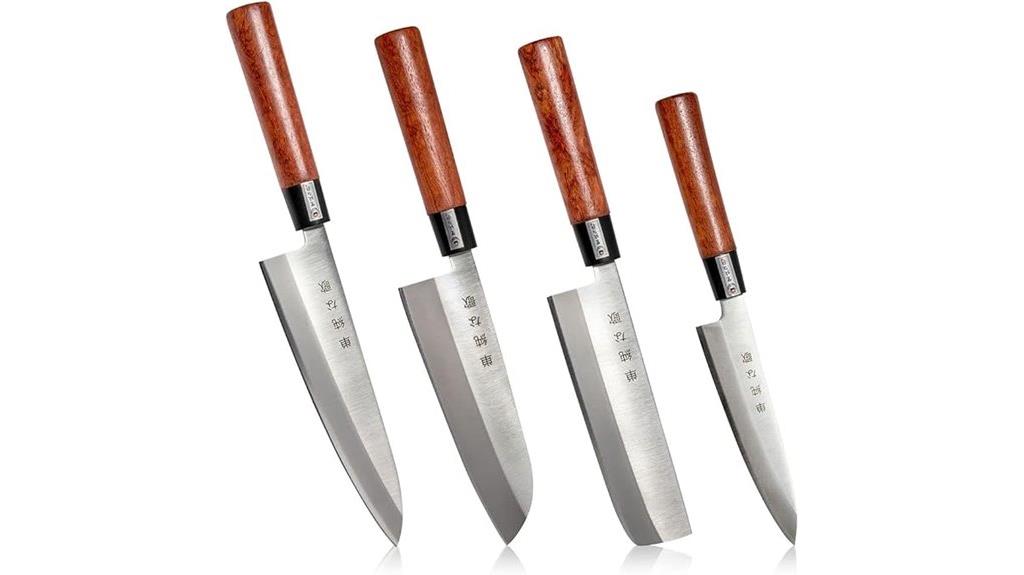
A traditional Japanese professional kitchen knife set is the ideal choice for chefs who demand precision, durability, and craftsmanship in their tools. Made with high-quality 420HC stainless steel, these blades are heat-treated for maximum hardness and edge retention, resisting rust and corrosion. The set includes essential knives like the Gyuto, Santoku, Nakiri, and Petty—each designed for specific tasks from heavy-duty chopping to delicate peeling. Full-tang construction with durable Rosewood handles provides stability, balance, and a comfortable grip. Perfect for both professional and home kitchens, this set delivers reliable performance and enduring quality. Plus, with a 30-day satisfaction guarantee, you can trust its long-term value.
Best For: professional chefs and home cooks who seek precision, durability, and craftsmanship in their kitchen knives.
Pros:
- Crafted with high-quality 420HC stainless steel for excellent edge retention and corrosion resistance
- Full-tang construction with traditional Rosewood handles for stability and comfort
- Includes versatile knives (Gyuto, Santoku, Nakiri, Petty) suitable for a wide range of culinary tasks
Cons:
- Rosewood handles may require careful maintenance to prevent drying or cracking
- Slightly higher price point compared to basic knife sets
- Requires proper sharpening and care to maintain optimal performance over time
Factors to Consider When Choosing Japanese Santoku Knives
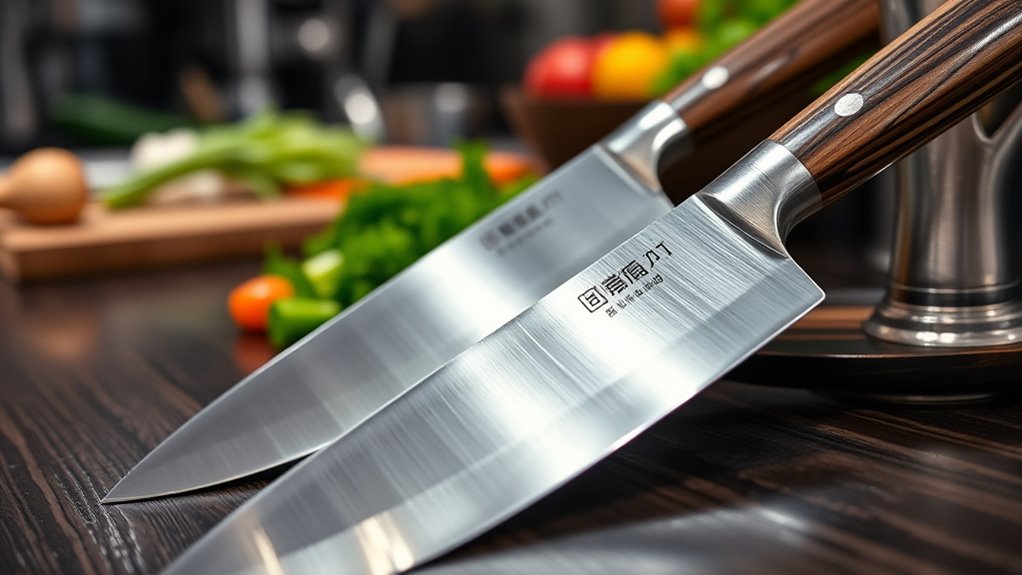
When choosing a Japanese Santoku knife, I focus on several key factors to guarantee I get the best fit for my needs. The quality of the blade material, ease of sharpening, and handle comfort are especially important, along with blade length, weight, and how much maintenance it requires. Considering these points helps me pick a knife that’s both reliable and comfortable to use.
Blade Material Quality
Choosing the right blade material is crucial because it directly affects a Santoku knife’s performance and longevity. High-quality blades are usually made from premium stainless steel, carbon steel, or Damascus steel, each offering different benefits. Hardness, measured in HRC, determines how well the edge holds up and how easy it is to sharpen. Higher HRC means longer-lasting sharpness, but it can also be more brittle. Forged blades tend to have a more uniform grain structure and greater durability compared to stamped ones. Some blades incorporate elements like cobalt for enhanced corrosion resistance or feature Damascus patterns for aesthetic appeal. Selecting the appropriate material ensures your knife stays sharp longer, resists rust and discoloration, and suits your specific culinary needs.
Sharpness and Edge
The sharpness of a Japanese Santoku knife hinges largely on its blade’s edge angle and the quality of steel used. Typically, an angle between 12-15 degrees per side creates a razor-sharp edge ideal for precise slicing. High-quality steels like VG10 or SG2 feature fine grains that allow for sharper edges that stay sharp longer, especially with regular honing. The sharpening method also plays a vital role; hand-honing or professional sharpening can refine the edge to reduce resistance and improve cutting performance. Steel hardness, measured in HRC, influences edge retention—harder steels hold their edge longer but can be more brittle. Additionally, a polished or honbazuke finish enhances initial sharpness and minimizes cutting effort, making your Santoku more effective out of the box.
Handle Comfort and Grip
A comfortable handle is essential for precise and safe cutting, especially during long kitchen sessions. An ergonomic shape, like octagonal or D-shaped handles, offers better grip stability and reduces hand fatigue. Handles crafted from natural materials such as rosewood or pakkawood provide a comfortable, non-slip grip that enhances control, even when hands are wet or greasy. The texture and surface smoothness of the handle also play a key role in maintaining a secure hold. Proper handle size and balanced weight distribution prevent strain on your wrist and fingers, making extended use more comfortable. Features like mosaic pins or full tang construction add durability, ensuring your grip remains firm and secure over time. Overall, handle comfort directly impacts your cutting efficiency and safety.
Blade Length and Weight
Blade length and weight considerably influence how a Santoku knife handles in the kitchen. A typical blade ranges from 5 to 7 inches, affecting maneuverability and task suitability. Heavier knives deliver more chopping power and stability, but they can cause fatigue during long use. Lighter knives provide agility and reduce wrist strain, making them perfect for precise slicing and delicate work. The right balance between length and weight depends on your hand size, strength, and the tasks you perform most often. Longer, heavier blades might feel unwieldy for those with smaller hands or less strength. Ultimately, choosing the right combination enhances control, comfort, and efficiency, so consider these factors carefully to find a Santoku that suits your style and needs in the kitchen.
Durability and Maintenance
Choosing a durable Santoku knife depends on the materials and construction it features. High-carbon stainless steel is a great choice because it offers improved durability and resists rust, corrosion, and discoloration. To keep the knife performing its best, regular honing and proper cleaning are essential—hand wash and dry immediately after use to prevent damage. Knives with full-tang construction provide added strength and better balance, which helps them last longer under heavy use. Additionally, a hollow edge or scalloped design reduces food sticking, meaning less frequent sharpening. Proper storage, like using a sheath or knife block, protects the blade from chipping and maintains its sharpness over time. These factors combined ensure your Santoku stays sharp and reliable for years.
Aesthetic and Craftsmanship
When selecting a Japanese Santoku knife, aesthetic appeal and craftsmanship are essential factors that elevate its value and beauty. I look for intricate Damascus patterns, hammered finishes, and handles made from elegant materials like rosewood or pakkawood, which add a sophisticated touch. Superior craftsmanship involves traditional forging, precise sharpening angles around 13-16 degrees, and meticulous finishing details that reflect skill and care. High-quality materials such as VG10, Damascus steel, or high-carbon stainless steel not only enhance visual appeal but also demonstrate artisanal quality. The design often incorporates cultural elements like mosaic pins and hand-polished blades, emphasizing heritage. A well-crafted Santoku balances beauty with functionality, making it a joy to own and use without sacrificing sharpness or durability.
Price and Value
Considering the wide range of prices for Japanese Santoku knives, it’s important to evaluate how cost aligns with quality and performance. Cheaper options under $50 can be tempting, but they often require more frequent sharpening and may have less durable handles or construction. Higher-end models over $200 typically feature premium materials like VG10 or Damascus steel, offering better edge retention and longer lifespan. Investing in a pricier knife usually means better overall performance and durability, saving money over time. Comparing features across different price points helps find a balance that suits your needs, whether you prioritize initial affordability or long-term value. Ultimately, a higher upfront investment can lead to improved cutting experience and fewer replacements, making it a smart choice for serious cooks.
Frequently Asked Questions
What Materials Ensure the Best Durability for Japanese Santoku Knives?
Stainless steel, especially high-carbon varieties like VG-10 or SG2, guarantees the best durability for Japanese santoku knives. These materials resist rust and corrosion while maintaining a sharp edge over time. Damascus steel is also popular for its strength and beautiful patterns. I always look for blades with these materials because they offer excellent longevity and dependable performance, making my cooking experience smoother and more enjoyable.
How Does Blade Thickness Affect Slicing Performance?
Blade thickness is like the heartbeat of a santoku; it determines how smoothly I glide through ingredients. Thinner blades slice with agility, cutting through vegetables and fish as if they’re whispers. Thicker blades provide strength and stability, ideal for heavier tasks like crushing garlic or carving meats. When I choose a knife, I consider the task’s dance—thinner for finesse, thicker for power—each shaping my culinary rhythm.
Are There Specific Maintenance Tips for High-Carbon Steel Santoku Knives?
Yes, I recommend cleaning high-carbon steel santoku knives immediately after use to prevent rust. Always hand wash and dry them thoroughly—never put them in the dishwasher. Regularly hone the edge with a sharpener, and occasionally oil the blade to prevent corrosion. Store in a dry, safe place, ideally in a knife block or on a magnetic strip. Proper maintenance keeps your knife sharp and in top condition for years.
What Distinguishes Professional-Grade Santoku Knives From Beginner Options?
A professional-grade Santoku knife is like having a magic wand in your kitchen, slicing effortlessly. It’s distinguished by its superior craftsmanship, high-quality materials, and razor-sharp edge retention. These knives often feature full-tang construction for better balance and durability, plus premium steel that’s easy to sharpen and maintain. Beginners might settle for less, but pros know the difference in performance, precision, and longevity that makes all the difference in culinary mastery.
How Does Handle Design Impact Comfort During Extended Use?
Handle design greatly impacts comfort during extended use. I find that a well-balanced, ergonomic handle reduces fatigue and provides a secure grip, even during long chopping sessions. The shape, material, and weight distribution matter — I prefer handles that contour naturally to my hand and offer a non-slip surface. When handle design fits well, it makes my cutting more precise and enjoyable, especially over hours of prep work.
Conclusion
In my experience, choosing the right Santoku knife is like finding the perfect dance partner—trustworthy, precise, and a joy to use. Whether you prefer the ultra-sharp edge of the imarku or the elegant craftsmanship of Yoshihiro, these knives will elevate your kitchen skills. Remember, a great knife feels like an extension of your hand, making every chop and slice smoother and more enjoyable. Happy cooking!
